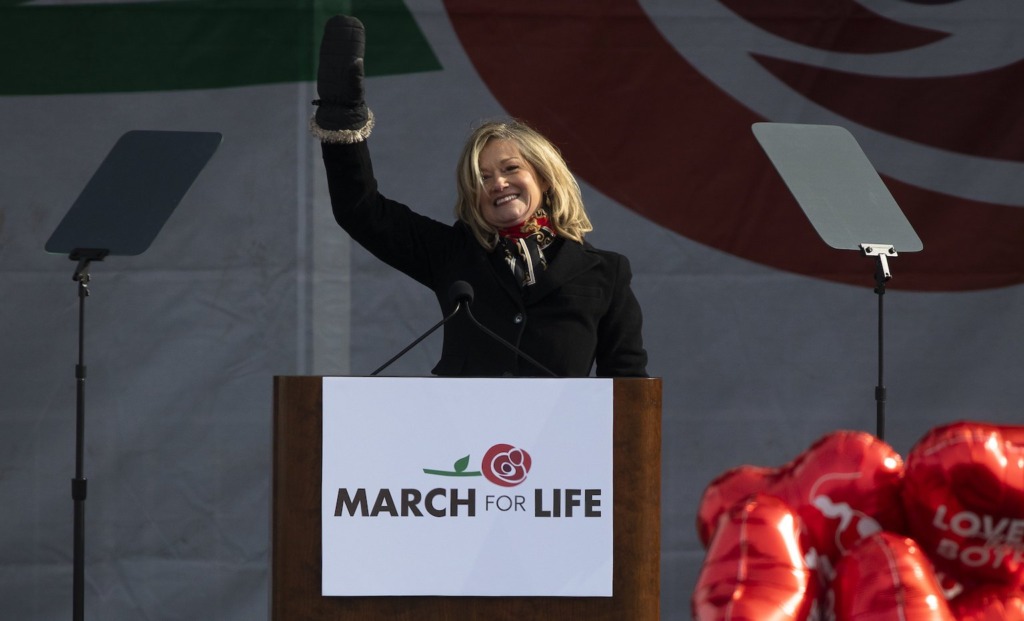WASHINGTON – As the March for Life prepares to hold its 50th annual event later this month, the national organization is taking its first steps into a post-Roe landscape.
The March for Life first took place in Washington, D.C., in 1974 in response to the U.S. Supreme Court’s Roe v. Wade decision legalizing abortion nationwide the previous year. Pro-life advocates have gathered in Washington to march each year since then to protest the ruling, with a smaller-in-scale event during the COVID-19 pandemic in 2021.
But the Supreme Court’s June 2022 ruling in Dobbs v. Jackson Women’s Health Organization that overturned Roe led some to question whether the national march would continue as a protest up Constitution Avenue ending at the high court itself.
Jeanne Mancini, March for Life president, told OSV News there was a “discernment process” about how the March would proceed, but it was clear they would continue the annual event.
“In a way, it was almost not a question because we have become the largest, longest running human rights demonstration worldwide,” Mancini said. “And the idea of shutting that down, while the human rights abuse of abortion is still sadly wildly rampant in the United States, just would make no sense.”
While the national event was tied to Roe, Mancini said, “the deeper foundation of the March for Life and its reason for being is to march in opposition to the human rights abuse of abortion and to witness to the beautiful, inherent dignity of unborn children and their mothers.”
While some changes were considered, Mancini said, such as potentially holding the March at a different time of year, March organizers “ultimately decided that we’re right where we should be, and we will continue to march in January.”
The 2023 March for Life’s theme is a nod to the pro-life movement’s new landscape: “Next Steps: Marching in a Post-Roe America.”
Speakers at the 2023 March for Life event, scheduled for Jan. 20, will include actor Jonathan Roumie, known for his role as Jesus in the biblical television drama “The Chosen,” as well as the musical group We Are Messengers.
Mancini said the March’s next steps include “the need to continue changing hearts and minds,” as well as enacting legislation and other advocacy work at both the state and the federal levels, and “increasing the safety net for families that are facing an unexpected pregnancy.”
“We really have our work cut out for us,” Mancini said.
Mancini pointed to another Supreme Court decision, Plessy v. Ferguson (1896) – which declared racial segregation legal under the U.S. Constitution – as an example of an egregious ruling the high court overturned decades later in Brown v. Board of Education (1954). Even then, she pointed out, more hard work remained to be done for racial integration following that decision.
“It puts some perspective on where we are with our human rights abuses and how it does take time to change culture,” Mancini said.
The Dobbs ruling sent the issue of legal abortion back to the U.S. states to legislate upon – a possibility the March for Life prepared for prior to the Dobbs case by launching individual state marches. But abortion remains a national issue as well, Mancini said.
‘It’s not just a state issue, it’s both-and,” Mancini said, indicating the U.S. Congress’ and the White House’s roles in regulating abortion at the federal level.
This year’s March for Life underscores that point by physically switching its end point from the U.S. Supreme Court to the U.S. Capitol.
While pro-life leaders have hailed the Dobbs decision for overturning Roe, they have seen a series of ballot losses for the pro-life cause in its wake. During the Nov. 8 midterm elections, voters in five U.S. states with ballot measures concerning abortion either rejected moves to restrict abortion, or they voted to codify abortion access.
Winning hearts and minds, and the ballot box, requires making the case for pro-life policies with compassion, Mancini said.
“We want to do everything possible to be as loving and as compassionate, and yet as honest and clear, as possible,” she said.

